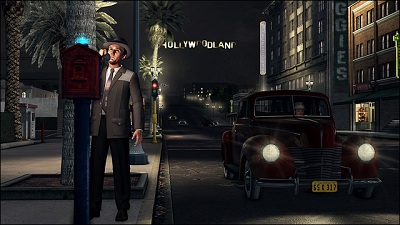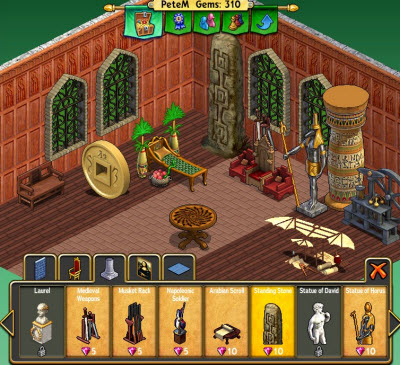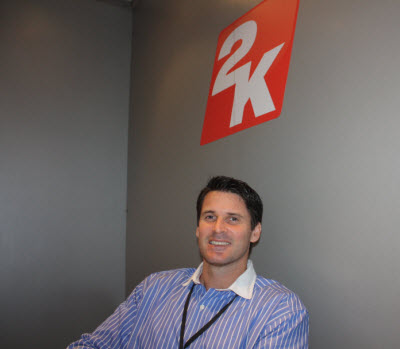 Karl Slatoff is the executive vice president and chief operating officer at Take-Two Interactive, which has published some of the hottest-selling video games in history, from Grand Theft Auto IV to Red Dead Redemption and this year’s LA Noire. Not everything New York-based Take-Two does is golden (Duke Nukem Forever is getting bad reviews), but Take-Two is definitely carving out a reputation as a haven for some of the video game industry’s most-talented developers.
Karl Slatoff is the executive vice president and chief operating officer at Take-Two Interactive, which has published some of the hottest-selling video games in history, from Grand Theft Auto IV to Red Dead Redemption and this year’s LA Noire. Not everything New York-based Take-Two does is golden (Duke Nukem Forever is getting bad reviews), but Take-Two is definitely carving out a reputation as a haven for some of the video game industry’s most-talented developers.
We talked with Slatoff at the recent E3 video game trade show about how to manage that talent. Clearly, he doesn’t see eye-to-eye with executives at game companies that are publishing sequels far more frequently than Take-Two is. Here’s a transcript of our interview.
VentureBeat: For the sake of the fans, I should ask if I can search your booth for any hidden Rockstar games.
Karl Slatoff: (Laughs). You can search all you want. You won’t find any. If you find one, let us know. They typically don’t come here and don’t do so much marketing and PR, at least at this event.
VB: So how do we interpret that? They just show off their games when they are ready?
KS: I don’t think you should interpret them being here or not here as anything. It’s just their own PR and marketing strategy. It’s pretty consistent and they have done it for the last several years running.
 VB: I heard LA Noire is off to a great start.
VB: I heard LA Noire is off to a great start.
KS: Yeah absolutely, very happy about it.
VB: Your track record is starting to look very good.
KS: It’s certainly nice to have the wind at our back when we have been investing in diversification for quite some time. It takes time for these projects to actually kick in and get out of the door. And now that they are out, we are having a lot of success, creatively and otherwise.
VB: I suppose you don’t have a set schedule for when you introduce major games. It seems like the big games ship whenever they are done.
KS: I think that’s the way it is for pretty much everybody we work with. We do some games on an annual basis such as our basketball and baseball titles. But for us, each game has its own individual development cycle, and those plans can change throughout the course of development. I would say the way we approach it is probably not that different from anybody else. It seems to be working.
VB: It seems that everybody else says the same thing, but you folks have been executing on your new original games.
KS: I don’t really talk about the competitors. We obviously have scored very well, and I think that is a testament to how great our creative teams are and the high creative bar that we have across both the 2K and Rockstar labels. We as a management team collectively try to foster an environment where creative people can thrive. That is a key part of our strategy, to create that environment where people can pursue their craft and do it in a way that is most productive.
VB: Do you see some opportunities beyond sports to do some of these games more often? Assassin’s Creed and Call of Duty have not gotten complaints about poor quality yet. But they come out every year.
KS: Every time that we come out with a new release, we think it’s for a AAA title, the highest quality. We are trying to break new ground every time we come up with something. It’s really hard to do that every single year. And I do believe you can have success for a period of time. But as far as what is the best way to manage a brand franchise so you’ve got longevity? As you move from generation to generation, that remains to be seen. We don’t subscribe to the philosophy of bringing a franchise out every single year. We think it takes a little bit more time to do something that is notably and meaningfully different each time you come out with a new title within a franchise. And for us it is about creating long-term value by creating franchises. It’s not just about getting excited about one franchise and beating it to death until it dies and going on to the next. We really think so much goes into doing this that we act like we are managing a long-term brand. That’s how we approach it.
VB: Is this similar to a Nintendo strategy where they have so many brands that they can come out with a new version of one every five years or so but still have something coming out every year?
KS: I think that we work from game to game. There are a lot of factors that go into when a sequel comes out. We talk about what is right for the brand, what we are trying to achieve with the sequel, what our resources are. I don’t know what Nintendo’s strategy is. I just know we have three or four factors we consider.
 VB: Are you interested in Nintendo’s Wii U?
VB: Are you interested in Nintendo’s Wii U?
KS: Yeah. We haven’t announced any specific support for Wii U at this point, but anytime you’ve got a new platform that could garner a significant audience, then we would be interested. It is an HD platform that has the processing power to develop a compelling triple experience. If it takes hold of the market, that is good for us. So from that perspective, we are very excited about that. Again we haven’t announced any support for it but obviously we have a great relationship with Nintendo, and we will be looking at the Wii U.
VB: The hard thing about the last cycle was you had to make something different for Nintendo’s console. Now you may be able to make one game for four different platforms.
KS: I think there is always going to be a certain amount of synergy. Let’s just assume that everyone is at the same quality level in terms of the high-definition piece. Art work is a significant part of development costs. But we are not interested in the ability to just do straight ports. We are not a big believer in straight ports in general. For us it’s more about developing for the specific capability of each machine. We focus on what the platform brings to bear. For us, if you are really going to do good job, look at the platform itself, analyze the capabilities and develop your game to take advantage of those capabilities and that is the best way to address that audience.
 VB: So you have the Duke Nukem Forever launching? How did you bring it home?
VB: So you have the Duke Nukem Forever launching? How did you bring it home?
KS: That’s probably a longer conversation, but the Gearbox Software guys have done a fantastic job in bringing that to market, and obviously we are very excited about it.
Alan Lewis (Take-Two corporate communications): It’s kind of surreal for me because years ago, I worked at GT interactive and I was here in 1997 when they first announced the title. In 1998, they announced they were switching to the Unreal engine. And here we are today.
VB: I suppose the fans are waiting for this one.
KS: I think that this game has that notoriety. It’s a very fun game. I think we are going to get some great reactions to it. [Editor’s note: In fact, the game got panned by critics and 2K Games had to fire an external PR firm that suggested, on Twitter, that it would withhold games from reviewers in the future based on how much venom they had for Duke Nukem Forever].
VB: I talked with Mike Gallagher [head of the Entertainment Software Association]. He said that we have four Mondays left now before the Supreme Court decision about the video game violence law comes down. He says the industry is prepared with a response, either way. What’s the strategy for that?
AL: Obviously it is an industry-wide issue. We are all hopeful that the courts will judge it accordingly and as they should. I think the ESA has done a really good job on behalf of the industry in terms of dealing with this head on and trying to communicate as fast as possible. You know what the stakes are and we are hopeful the outcome will be positive for the industry.
I think you can assume as with any of our major court cases that, regardless of the outcome, the parties involved will have a response. We are hopeful. We’ve made a very strong argument and hopefully it goes the way we believe.
VB: How do you feel about the line-up here for you guys?
KS: We are really excited about it. I think it is one of the best 2K line-ups we have had. It is very diverse — each title is different in its own way. I think that is very important.
 VB: How are you managing LA Noire going forward?
VB: How are you managing LA Noire going forward?
KS: We have downloadable content coming up which we did announce. In terms of the future of this franchise, we are thrilled with it. We haven’t announced to plans for the future.
VB: How are you adapting to digital gaming?
KS: Digital can mean so many different things. Different people think about digital differently. I think if somebody wants a game, we want to get it to them via online or other ways. And that was about 9 percent of our revenue for last year. But that’s just digital distribution and I think that is relatively easy.
In terms of online gaming, it’s a very different thing. Our approach has been to start with our franchises. We’ve announced three initiatives in Asia. It’s almost a $9 billion market out there for online gaming. It is more advanced than the Western market, particularly in the free-to-play world. We’ve got a deal announced with XL Games doing a 2K franchise game that we haven’t named yet. We’ve got a deal with Nexon to do with baseball game in Korea and a deal with Tencent to do with the NBA game in China. So our idea is to partner with folks who have got platform in place and really know what they are doing. Between those three, they are the best in class for what they do in each of the regions. I am taking our brands and our franchises to those markets that provide us with a lot of upside and allowing us to invest wisely and minimizing our risk in doing so.
So that’s our initial approach and that’s just a stepping stone. Obviously we are a global company and any project that we take on we think about from a global context. We are starting in Asia. We’ve also got our activities in the more casual side of the business which is for the most part Facebook.
We have Civilization World. It will be launching in the summer. With Facebook, you are limited by what those platforms can do. But I think when it actually launches publicly, what you will see is it is still a very different experience than anything else that is out there on Facebook. And we are pushing the limits of what the platform can actually do. I think that was a good thing and it fits within the culture of Take-Two to go after that. We look at the more casual platforms, whether they are iPhone-based or the Android-based or social networks, as a platform for us to broaden the audience for our AAA titles. Civ World is a great example of that.
 VB: When I look at that game, I saw the graphics as more cartoon-like than realistic. Civilization V had very different, more realistic art that appeals to hardcore gamers. How did you look at that?
VB: When I look at that game, I saw the graphics as more cartoon-like than realistic. Civilization V had very different, more realistic art that appeals to hardcore gamers. How did you look at that?
KS: There is an issue where you are dealing with a platform and there is a different audience. Firaxis took all of this into account in designing their game.
VB: It looks as though there is an opportunity to address the hardcore audience on Facebook.
KS: There might be. Certainly from the marketing perspective. From the gaming perspective, it is unclear at this point how much overlap there is between the true hardcore gaming audience and the social gamer. Particularly, the paying social gamer. There isn’t necessarily an overlap of the demographics. But we don’t necessarily subscribe to the belief that the social gaming world is competing with or taking away from or detracting from the core gaming audience. You are not going to satisfy the same itch by playing Pong as you are by playing BioShock or GTA. You don’t satisfy the same itch by watching Leave it to Beaver as you do watching Scarface. It’s a very different experience and one doesn’t replace the other. Obviously those platforms will evolve and they will be more sophisticated.
VB: BioShock Infinite looks spectacular. It’s a ways off.
KS: Thank you. It’s for 2012.
VB: It is interesting that it has the BioShock name to it, implying that it is a sequel. But the game is so original and different.
AL: Ken Levine’s view of BioShock is that it is an experience or mindset within your psyche.
VB: To me, it almost meant that you will have the same kind of game play, wielding two different weapons or powers at the same time.
AL: It also has a great narrative experience.
KS: I think it is a good example of what we talked about before about managing a franchise. We are not just looking to do the same thing over and over again within that franchise in order to see how long we can do it. We have people like Ken Levine with fantastic development talent. They think about things that way, managing the franchise and thinking about doing something that is meaningfully different and ground breaking.
VB: It seems like you guys may feel strongly feel that development talent is very finite. If you had them make games every year, you would spread them thin.
KS: Yeah. By definition, talent in the world is finite because there are several people on the planet who have the right kind of skill set for this. Sam and Dan Houser. Greg Thomas. Sid Meier. They are very unique. Every human being has their limits. I think our guys have an incredible capacity to make great games. Every time we think they have reached their capacity, they surprise us. It comes back to reinforcing our feeling that quality is more important than quantity. But I don’t want to put an artificial barrier around our guys because they have an incredible amount of capacity to take on multiple projects at the same time.
AL: Technology tools also continue to evolve. That gives them their canvas to paint on. It allows them to realize a lot more of their creative vision. If you took some of the talents that Karl was referring to, 10 years ago, they may have envisioned a lot of creative things. But the technology just wasn’t there. It wasn’t feasible to realize some of that stuff. Now they are able to create environments to do things, have deeper levels of immersion in storytelling. So I think part and parcel of the driver and the capacity is also having that more robust canvas on which they can create. I think they get inspired not only from other forms of entertainment but also through the continuous advance of technology.
 We’ll be exploring the most disruptive game technologies and business models at our third annual GamesBeat 2011 conference, on July 12-13 at the Palace Hotel in San Francisco. It will focus on the disruptive trends in the mobile games market. GamesBeat is co-located with our MobileBeat 2011 conference this year. To register, click on this link. Sponsors can message us at sponsors@venturebeat.com. To pitch a startup at the Who’s Got Game contest at GamesBeat 2011, click here.
We’ll be exploring the most disruptive game technologies and business models at our third annual GamesBeat 2011 conference, on July 12-13 at the Palace Hotel in San Francisco. It will focus on the disruptive trends in the mobile games market. GamesBeat is co-located with our MobileBeat 2011 conference this year. To register, click on this link. Sponsors can message us at sponsors@venturebeat.com. To pitch a startup at the Who’s Got Game contest at GamesBeat 2011, click here.
VentureBeat's mission is to be a digital town square for technical decision-makers to gain knowledge about transformative enterprise technology and transact. Learn More

